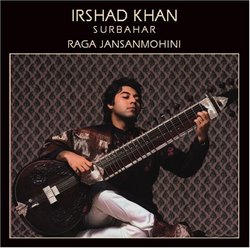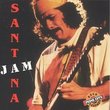| All Artists: Irshad Khan Title: Raga Jansanmohini Members Wishing: 0 Total Copies: 0 Label: India Archives Release Date: 6/28/1996 Genres: International Music, Pop Styles: Reggae, India & Pakistan, India Number of Discs: 1 SwapaCD Credits: 1 UPC: 731838102320 |
Search - Irshad Khan :: Raga Jansanmohini
 | Irshad Khan Raga Jansanmohini Genres: International Music, Pop
Irshad Khan is, today, the leading young performer on the surbahar (bass sitar) and after his father and Guru, the great Ustad Imrat Khan, the world's most accomplished active player on the surbahar. Raga Jansanmohini is a... more » |
Larger Image |
CD DetailsSynopsis
Product Description Irshad Khan is, today, the leading young performer on the surbahar (bass sitar) and after his father and Guru, the great Ustad Imrat Khan, the world's most accomplished active player on the surbahar. Raga Jansanmohini is adopted from South India and in Irshad Khan's interpretation creates a lively mood embued with the playful atmosphere of two lovers. Similar CDs
|
CD ReviewsAn emotional rendering. Pharoah S. Wail | Inner Space | 12/11/2004 (4 out of 5 stars) "I always wonder what type of people will be reading certain reviews of mine. Experts who knows a thousand times more than I do, or someone looking into something for the first time? There's no way to know, so I try to write a bit for both. To begin, the surbahar is the bass sitar. It has a lower and more resonant tone than the sitar. To put it mildly, it can envelop you in this lush cascade of sonic warmth. If you're coming at this cd from, say, a Ravi Shankar at Monterey Pop background, you need to know that there is no tabla (the drums) here. Alap, jor, and jhala are the unaccompanied (whether the instrument be sitar, surbahar, sarangi, whatever...) exploration of the raga's mood, tone, and for lack of a better word, the "rules" that define that raga as interpreted by the gharana (tradition/school of thought) to which the artist belongs. I just want to make sure any people new to Hindustani music realize that this disc doesn't have the thunderous "sitar and tabla duo" for which you may be looking. For that, you want a disc with gats. There are some excellent points to this cd, as well as some disappointing moments. As per usual with the surbahar, the alap and jor are wonderful. That resonance allows for greater control and extension of the note-bending that is the beautiful hallmark of Hindustani music. One finger stroke and then a whole world of bent notes and small, soul-caressing upturns follows. That is the magic of the surbahar, as well as the larger "strumming" that just washes you in sound. The alap and jor are where Irshad shines here. He allows you to really ride an emotional wave with the notes. There are times where your heart rises up and then the feeling is resolved and you exhale and sink into yourself. I almost always listen to surbahar discs in headphones. You really feel the instrument more, in my opinion. One small complaint of mine is answered in the liner-notes. The original plan was to play two alaps of different ragas, but after recording this alap Irshad stopped and discussed changing the plan and continuing into the jor and jhala. For me, during a great performance, one of the magical moments can be that transition from alap to jor, but here we are robbed of that with a full break, and then the jor begins. Like I said though, it's a small complaint, as there is alot of great music on both sides of the break... and besides, breaking the tracks like that isn't new. It happens on plenty of other Hindustani discs. My main complaint with this performance is that later on in the jhala, there are a few times where it feels like Irshad plays himself into a corner and isn't sure how to get out. There are some moments of semi-sloppiness and breaks in momentum where it feels like he is trying to regroup and move on. On a disc containing 67+ minutes of music it's not all that big of a deal, considering how much of the music is great. It does keep this performance from being a truly top-tier stunningly beautiful performance from beginning to end, though. I absolutely recommend this disc, as the great far outweighs the couple stumbles, but if you can only have one surbahar disc, I would instead point you towards Manilal Nag's Raga Nat Bhairav disc (also on India Archive label), which I reviewed here some time ago. On that you get a magical alap, jor, and jhala (on surbahar), followed by another great alap and 2 gats (on sitar) with Samir Chatterjee on tabla. Although Manilal uses the surbahar more in the vein of a sitar with extended ability for amazing meends. To truly hear the low end of the surbahar being worked... to truly have that resonance bathing you in sound... you need this disc by Irshad." The Future of an Instrument? Pharoah S. Wail | 07/08/2002 (5 out of 5 stars) "Irshad Khan is one of Imrat Khan's four sons, appearing here, UNUSUALLY, in a serious production. This is how it should always be; the recording reveals him as a fine classical musician. The disc is 100% surbahar, which makes it actually surpass many of Imrat's own."
|

 Track Listings (2) - Disc #1
Track Listings (2) - Disc #1



